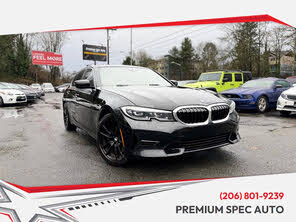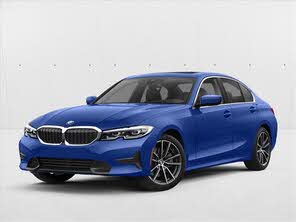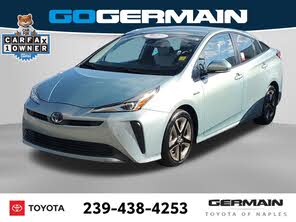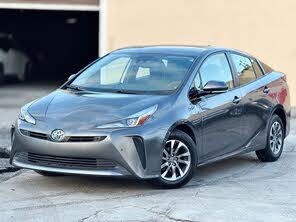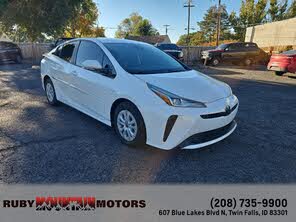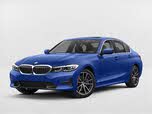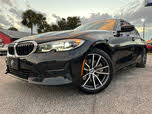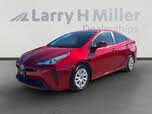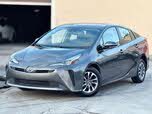2020 BMW 3 Series vs 2019 Toyota Prius
Overview | |
MSRP$23,770 | MSRP$40,750 |
Listings207 | Listings619 |
Ratings & Reviews | |
User Reviews | User Reviews |
Expert reviews7.3 out of 10 | Expert reviews8.2 out of 10 |
Pros
Cons
| Pros
Cons
|
2019 Toyota Prius Reviews SummaryReliable, efficient, affordable, practical, and safe, the 2019 Toyota Prius checks off multiple boxes on a typical car shopper’s list. The latest version is even decent to drive, but the Prius' styling does the car no favors. For 2019, Toyota tries to tone down the design, revises its trim-level strategy, and adds a new electric all-wheel-drive option to the car. | |
2020 BMW 3 Series Reviews SummaryDoes BMW still use “The Ultimate Driving Machine” as its advertising tagline? Yes, it does. And with the arrival of the 2020 BMW M340i, which slots between the existing 330i and the forthcoming M3, the company proves there is substance behind the slogan. | |
Popular Features & Specs | |
Engine1.8L 121 hp I4 Hybrid | Engine2.0L 255 hp I4 |
Drive TrainFWD | Drive TrainRWD |
Seating Capacity5 | Seating Capacity5 |
Horsepower | Horsepower255 hp @ 5000 rpm |
EV Battery Capacity0.7 kWh | EV Battery Capacity |
MPG City58 | MPG City26 |
MPG Highway53 | MPG Highway36 |
Engine | |
Engine Name1.8L 121 hp I4 Hybrid | Engine Name2.0L 255 hp I4 |
Torque | Torque295 lb-ft @ 1450 rpm |
Horsepower | Horsepower255 hp @ 5000 rpm |
DrivetrainFWD | DrivetrainRWD |
Fuel Economy | |
EV Battery Capacity0.7 kWh | EV Battery Capacity |
MPG City58 | MPG City26 |
MPG Highway53 | MPG Highway36 |
Interior | |
Seating Capacity5 | Seating Capacity5 |
Key Features | |
Navigation System | Navigation SystemStandard |
Sunroof/Moonroof | Sunroof/MoonroofStandard |
Safety | |
Front Crash Overall4 | Front Crash Overall |
Side Crash Overall5 | Side Crash Overall |
Dimensions & Capacity | |
Cargo Space27.4 cu ft | Cargo Space13.0 cu ft |
Curb Weight3010 lbs | Curb Weight3589 lbs |
Height57.9 in | Height56.8 in |
Length180.0 in | Length185.7 in |
Width69.3 in | Width81.4 in |
Wheelbase106.3 in | Wheelbase112.2 in |
Maximum Payload825 lbs | Maximum Payload |
Number of doors4 | Number of doors4 |
Overview | ||
MSRP | $23,770 | $40,750 |
Listings | ||
Ratings & Reviews | ||
User reviews | ||
Expert reviews | 7.3 out of 10Read full review | 8.2 out of 10Read full review |
Pros & cons | Pros
Cons
| Pros
Cons
|
Summary | Reliable, efficient, affordable, practical, and safe, the 2019 Toyota Prius checks off multiple boxes on a typical car shopper’s list. The latest version is even decent to drive, but the Prius' styling does the car no favors. For 2019, Toyota tries to tone down the design, revises its trim-level strategy, and adds a new electric all-wheel-drive option to the car. | Does BMW still use “The Ultimate Driving Machine” as its advertising tagline? Yes, it does. And with the arrival of the 2020 BMW M340i, which slots between the existing 330i and the forthcoming M3, the company proves there is substance behind the slogan. |
Video | ||
Popular Features & Specs | ||
Engine | 1.8L 121 hp I4 Hybrid | 2.0L 255 hp I4 |
Drive Train | FWD | RWD |
Seating Capacity | 5 | 5 |
Horsepower | 255 hp @ 5000 rpm | |
EV Battery Capacity | 0.7 kWh | |
MPG City | 58 | 26 |
MPG Highway | 53 | 36 |
Engine | ||
Engine Name | 1.8L 121 hp I4 Hybrid | 2.0L 255 hp I4 |
Torque | 295 lb-ft @ 1450 rpm | |
Horsepower | 255 hp @ 5000 rpm | |
Drivetrain | FWD | RWD |
Fuel Economy | ||
EV Battery Capacity | 0.7 kWh | |
MPG City | 58 | 26 |
MPG Highway | 53 | 36 |
Interior | ||
Seating Capacity | 5 | 5 |
Key Features | ||
Navigation System | Standard | |
Sunroof/Moonroof | Standard | |
Safety | ||
Front Crash Overall | 4 | |
Side Crash Overall | 5 | |
Dimensions & Capacity | ||
Cargo Space | 27.4 cu ft | 13.0 cu ft |
Curb Weight | 3010 lbs | 3589 lbs |
Height | 57.9 in | 56.8 in |
Length | 180.0 in | 185.7 in |
Width | 69.3 in | 81.4 in |
Wheelbase | 106.3 in | 112.2 in |
Maximum Payload | 825 lbs | |
Number of doors | 4 | 4 |
The 2019 Toyota Prius was not known for its aesthetic appeal. Its design, characterized by a boomerang-shaped profile and split rear glass, aimed to make a statement when it first debuted. However, by 2019, the extroverted design seemed to hurt sales more than help. Despite its unconventional looks, the Prius offered a practical solution for daily driving, with a new lineup that included L Eco, LE, XLE, and Limited trims. The XLE with AWD, painted in Electric Storm Blue, featured an Advanced Technology Package and various upgrades, bringing its price to $32,146. The interior, though unusual, functioned well, with centralized controls and a glossy black trim that attracted dust.
In contrast, the 2020 BMW 3 Series exuded a more refined and aquatic appearance with its lidded headlights, bulging hood, and wide air intakes. The M340i trim, in particular, was praised for its driving dynamics and luxurious feel. Starting at $40,750 for the base 330i and rising to $56,000 for the M340i with xDrive, the test car's total came to $69,570 with additional options. The interior featured high-quality materials, including off-white Ivory leather and a Tanzanite Blue exterior paint. The 3 Series' interior was both purposeful and luxurious, with a focus on quality and comfort.


















The 2019 Toyota Prius combined a 1.8-liter 4-cylinder gasoline engine with an electric motor to produce 121 horsepower. The optional AWD-e system added a 5-kilowatt rear electric motor and a nickel-metal hydride battery, powering the rear wheels up to 43 mph. The AWD-e system resulted in lower gas mileage, with a standard front-drive Prius achieving 52 mpg in combined driving, while the AWD-e version managed 50 mpg. The Prius featured a continuously variable transmission (CVT) and offered a smooth ride with decent handling. The EV driving mode allowed for electric-only operation at speeds under 25 mph, and the blended regenerative brakes recharged the battery. Despite its complex-sounding technology, the Prius was easy to drive and offered a quiet ride in urban environments.
The 2020 BMW 3 Series, particularly the M340i trim, featured a turbocharged 3.0-liter inline 6-cylinder engine producing 382 horsepower and 369 pound-feet of torque. The car's engineering package included BMW’s rear-biased xDrive all-wheel-drive system, a rear M Sport differential, and massive M Sport brakes. The M340i's 8-speed automatic transmission, while not a manual, provided a launch-controlled 0-60 mph time of 4.1 seconds. The car's handling was enhanced by structural and suspension changes, including variable sport steering and M Adaptive underpinnings. The 3 Series offered a thrilling driving experience, with the automatic transmission and paddle shifters proving effective in real-world driving.
The 2019 Toyota Prius offered comfortable seating for four adults, with manual height adjustment for the driver's seat and heated front seats. Rear passengers enjoyed good thigh support and decent legroom, though air conditioning vents were absent. The Prius XLE and Limited trims featured SofTex leatherette upholstery, which could trap sweat in hot weather. The hatchback design provided up to 27.4 cubic feet of luggage space behind the rear seat, expandable to 65.5 cubic feet with the seat folded down. The AWD-e version offered slightly less cargo space. The Prius was pitched as an alternative to small crossover SUVs, though it lacked the ground clearance for more challenging terrain.
The 2020 BMW 3 Series featured supportive front seats with high-quality leather, front-seat heaters, and a heated steering wheel. Rear-seat entry and exit were somewhat awkward, but the seats provided excellent support and comfort. The car's controls were a mix of traditional and modern, with some hard-to-find functions. The widescreen infotainment system was well-integrated, and the iDrive system was the best version yet. Storage space was generous, with a covered bin for a wireless smartphone charger and a trunk offering 17 cubic feet of space. Despite its deep but narrow trunk, the 3 Series provided ample storage for a family sedan.
The 2019 Toyota Prius Limited trim featured an impressive infotainment system with an 11.6-inch touchscreen, navigation, JBL sound system, and more. However, the XLE AWD-e test car had a standard 6.1-inch touchscreen with Bluetooth and a CD player. The instrumentation was housed in a horizontal strip below the windshield, with some displays appearing outdated. The Advanced Technology Package included a head-up display and adaptive headlights. The Prius lacked Apple CarPlay and Android Auto, though it did offer wireless smartphone charging.
The 2020 BMW 3 Series boasted a sophisticated iDrive infotainment system with a touchscreen display, natural voice recognition, and gesture control. The system was easy to use, with intuitive menu pathways and a clean design. Gesture control allowed for volume adjustment and radio station changes with simple hand movements. The "Hey, BMW" voice recognition system was highly effective, responding to natural commands for navigation, climate control, and more. The head-up display was visible even with polarized sunglasses, enhancing the driving experience.
The 2019 Toyota Prius Limited trim included Safety Connect services, offering automatic collision notification, emergency assistance, and more. Standard safety features across all trims included adaptive cruise control, forward-collision warning with automatic emergency braking, lane-departure warning, lane-keeping assist, and automatic high-beam headlights. The LE trim added blind-spot monitoring, rear cross-traffic alert, and parking assist. The Prius received a 5-star rating from the federal government and a Top Safety Pick rating from the IIHS.
The 2020 BMW 3 Series required two Driving Assistance option packages to access the latest advanced driving assistance systems. While the systems were accurate, they sometimes lacked smoothness. The lane-keeping assist system was particularly abrupt, reminding drivers to stay engaged. The 3 Series received a Top Safety Pick+ rating from the IIHS when equipped with adaptive full LED headlights.
CarGurus highlights

According to CarGurus experts, the overall rating for the 2019 Toyota Prius is 7.3 out of 10, while the 2020 BMW 3 Series scores 8.2 out of 10. Based on these ratings, the 2020 BMW 3 Series is the recommended choice for those seeking a more engaging driving experience, luxurious interior, and advanced technology. The Prius remains a solid option for those prioritizing fuel efficiency and practicality.
Choose the 2020 BMW 3 Series if:
- You seek a thrilling driving experience with powerful performance.
- You appreciate a luxurious interior with high-quality materials.
- You want advanced technology and a sophisticated infotainment system.
Choose the 2019 Toyota Prius if:
- You prioritize fuel efficiency and low running costs.
- You need a practical and spacious hatchback with ample cargo space.
- You value standard safety features and a high safety rating.
CarGurus highlights

According to CarGurus experts, the overall rating for the 2019 Toyota Prius is 7.3 out of 10, while the 2020 BMW 3 Series scores 8.2 out of 10. Based on these ratings, the 2020 BMW 3 Series is the recommended choice for those seeking a more engaging driving experience, luxurious interior, and advanced technology. The Prius remains a solid option for those prioritizing fuel efficiency and practicality.
Choose the 2020 BMW 3 Series if:
Shop Now- You seek a thrilling driving experience with powerful performance.
- You appreciate a luxurious interior with high-quality materials.
- You want advanced technology and a sophisticated infotainment system.
Choose the 2019 Toyota Prius if:
Shop Now- You prioritize fuel efficiency and low running costs.
- You need a practical and spacious hatchback with ample cargo space.
- You value standard safety features and a high safety rating.

By: CarGurus + AI
At CarGurus, our team of experienced automotive writers remain at the heart of our content operation, conducting hands-on car tests and writing insightful guides that are backed by years of industry experience. To complement this, we are harnessing AI to make our content offering more diverse and more helpful to shoppers than ever. To achieve this, our AI systems are based exclusively on CarGurus content, ratings and data, so that what we produce is both unique to CarGurus, and uniquely helpful to car shoppers.






